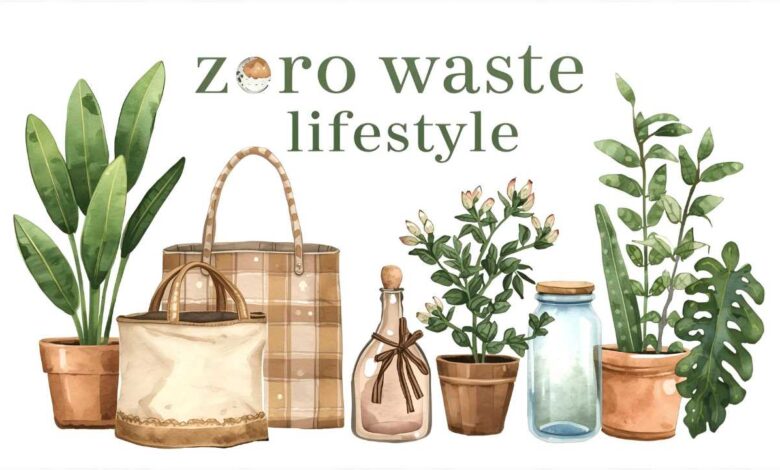Zero Waste Lifestyle for Everyday Living

A global movement toward living with more purpose, accountability, and sustainability has replaced the trend of adopting a zero waste lifestyle. Many people are choosing to reconsider how they use and dispose of products as a result of the effects of climate change, overflowing landfills, and excessive consumerism. This lifestyle’s basic yet effective concept is to use less, reuse what you can, recycle when you can, and eventually try to avoid sending anything to landfills. However, this journey is about consistent, thoughtful efforts that add up to a huge impact rather than perfection.
What is Zero Waste Lifestyle?
Reducing the amount of trash we produce—whether it be single-use packaging, plastic wrappers, or outdated items that usually wind up in the trash—is the main goal of the zero waste lifestyle. This strategy promotes choosing sustainable alternatives and recognizing the value in reusing items rather than throwing them away carelessly. The movement advocates rethinking habits to live in harmony with the environment rather than depriving oneself.
Here is a comparison of zero waste lifestyle practices and traditional consumer habits to show the essence of zero waste:
| Aspect | Traditional Consumer Habits | Zero Waste Lifestyle Practices |
| Grocery Shopping | Buying packaged foods and plastic bags | Using cloth bags, bulk bins, and glass jars |
| Personal Care Products | Disposable razors, bottled shampoo | Safety razors, shampoo bars, DIY options |
| Household Cleaning | Chemical cleaners in plastic bottles | Vinegar, baking soda, refillable bottles |
| Fashion Choices | Fast fashion, trend-based buying | Thrifting, capsule wardrobe, ethical brands |
| Food Waste | Leftovers thrown away | Composting, meal planning, creative cooking |
| Water Usage | Bottled water consumption | Refillable bottles, water filters |
This table demonstrates how the zero waste lifestyle promotes thoughtful swaps rather than necessitating sacrifice. Every decision lessens waste and the environmental burden.
The Origins and Growth of the Zero Waste Movement
Indigenous cultures that lived in balance with the environment, consuming only what was required, and returning organic waste to the earth are the origins of zero waste. However, environmentalists and activists helped popularize the phrase “zero waste” in the late 20th century. It really took off in the 2000s, particularly after celebrities like Bea Johnson made the movement more widely known with realistic, everyday methods. The idea has now expanded into a worldwide philosophy that affects households, companies, and even governmental regulations.
Why Choose a Zero Waste Lifestyle?
Individuals have different reasons for embracing zero waste. Some people want to lessen their environmental impact. Others want to avoid disposable items in order to save money. And for many, it’s a mix of moral and pragmatic considerations.
Living waste-free entails:
- Reducing dependence on landfills and incinerators.
- Conserving resources and reducing pollution.
- Encouraging a healthier, toxin-free home.
- Inspiring others and building community awareness.
The way of life offers both personal and group advantages. For instance, using reusable coffee cups instead of single-use ones reduces waste and ultimately saves money.
Practical Steps to Begin the Zero Waste Journey
The idea that this lifestyle needs to be drastically changed right away is among the most pervasive misconceptions about it. In actuality, long-lasting change frequently results from tiny, gradual steps. Here are a few easy steps for beginners:
- Refuse unnecessary items: Say no to freebies, flyers, or items you don’t need.
- Reduce consumption: Buy less but buy better quality.
- Reuse and repurpose: Give a second life to jars, bags, or clothing.
- Recycle smartly: Focus on items that can truly be recycled in your local facilities.
- Compost: Convert food scraps into nutrient-rich soil instead of tossing them away.
These actions help novices feel empowered rather than overwhelmed and make the lifestyle approachable.
Zero Waste Lifestyle and Food Choices
One of the largest categories of waste is food. The impact is substantial, ranging from needless packaging to uneaten leftovers. Choosing local produce, cooking at home, and shopping at bulk stores are all part of a zero waste approach to food. Food waste can also be significantly reduced by learning inventive recipes that make use of leftover ingredients. Another important factor is composting, which keeps organic waste out of landfills.
Challenges of the Zero Waste Lifestyle
This lifestyle has drawbacks despite its advantages. Since not everyone can afford sustainable products or has access to bulk food stores nearby, accessibility is still a significant obstacle. People may also feel judged by society if they are not “perfectly zero waste.” Another consideration is time, since meal planning and do-it-yourself projects demand work.
The secret is to approach zero waste as a journey rather than a rigid rule. What matters is progress, not perfection.
How Zero Waste Saves Money
The potential for financial savings is one underappreciated advantage of zero waste living. For instance:
- Brewing coffee at home saves hundreds of dollars annually.
- Investing in a durable water bottle eliminates repeated purchases.
- Thrifting or creating a capsule wardrobe prevents overspending on fast fashion.
Some sustainable substitutions, like glass containers or stainless steel straws, may seem pricey up front, but they soon pay for themselves in the long run.
The Role of Community in Zero Waste Living
While individual endeavors hold significant power, collective action amplifies the effect. Opportunities for group change are created by neighborhood composting initiatives, refill stores, and zero waste gatherings. Social media groups and online communities also offer encouragement and support, which keeps people inspired.
Zero Waste Lifestyle in the Modern World
Nowadays, a lot of companies are adopting zero waste practices, such as restaurants composting food scraps and supermarkets providing refill stations. Even businesses are changing their business models and making investments in circular economies, which create products that can be recycled or reused indefinitely. In order to address the climate crisis, the movement is expanding beyond households to impact systemic change.
Final Thoughts
The zero waste lifestyle focuses on making deliberate, continuous efforts to lessen our environmental impact rather than striving for perfectionism. It challenges people to reconsider their routines, value resources, and put sustainability ahead of convenience. Every repaired item, composted banana peel, and reusable bag helps create a cleaner, healthier world. Despite the difficulties, the benefits—both domestically and internationally—make this way of life worthwhile.
FAQ on Zero Waste Lifestyle
Q1: What does zero waste lifestyle mean in simple terms?
A: It entails attempting to minimize waste by rejecting single-use items, reusing items, and recycling or composting rather than discarding items.
Q2: Like some online zero wasters, do I have to put all of my trash in a jar?
A: That is merely a symbolic example. Consistent waste reduction, not perfection or peer comparison, is the true objective.
Q3: Is living a zero-waste lifestyle costly?
A: Over time, it can result in cost savings. Some sustainable products are more expensive up front, but because they are long-lasting and reusable, they save money over time.
Q4: If there are no bulk stores in my area, how can I begin implementing zero waste?
A: Start with easy adjustments like composting, cooking at home, avoiding bottled water, and using reusable bags. Although accessibility may restrict some options, even modest efforts have an impact.
Q5: Can families with children lead waste-free lives?
A: Definitely. Reusable diapers, used toys, and mindful consumption are all options available to families. Engaging children also promotes environmentally conscious behavior at a young age.
Q6: When beginning zero waste, which items are the simplest to swap?
A few of the simplest substitutions include using cloth grocery bags, reusable water bottles, stainless steel straws, and bar soap rather than bottled soap.
Q7: Is there a real impact from living a zero waste lifestyle?
A: Every action has a cumulative effect. Environmental pollution and landfill waste are significantly reduced when millions of people make small changes.



